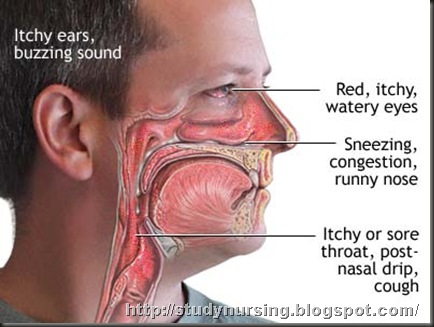Definition
Allergic rhinitis is a collection of symptoms, mostly in the nose and eyes, which occur when you breathe in something you are allergic to, such as dust, dander, or pollen.
When these symptoms are caused by plant pollen, the allergic rhinitis is commonly called hay fever.
See also:
Causes, incidence, and risk factors
An allergen is something that triggers an allergy. When a person with allergic rhinitis breathes in an allergen such as pollen or dust, the body releases chemicals, including histamine. This causes allergy symptoms such as itching, swelling, and mucus production.
Hay fever involves an allergic reaction to pollen. (A similar reaction occurs with allergy to mold, animal dander, dust, and similar inhaled allergens.)
The pollens that cause hay fever vary from person to person and from region to region. Large, visible pollens are seldom responsible for hay fever. Tiny, hard to see pollens more often cause hay fever. Examples of plants commonly responsible for hay fever include:
- Trees (deciduous and evergreen)
- Grasses
- Ragweed
The amount of pollen in the air can play a role in whether hay fever symptoms develop. Hot, dry, windy days are more likely to have increased amounts of pollen in the air than cool, damp, rainy days when most pollen is washed to the ground.
Some disorders may be associated with allergies. These include eczema and asthma.
Allergies are common. Your genes and environmental may make you more prone to allergies.
Whether or not you are likely to develop allergies is often passed down through families. If both your parents have allergies, you are likely to have allergies. The chance is greater if your mother has allergies.
Symptoms
- Coughing
- Headache
- Itching nose, mouth, eyes, throat, skin, or any area
- Problems with smell
- Runny nose
- Sneezing
- Sore throat
- Stuffy nose (nasal congestion)
- Tearing eyes
allergic rhinitis, including whether the symptoms vary according to time of day or the season, exposure to pets or other allergens, and diet changes.
Allergy testing may reveal the specific substances that trigger your symptoms. Skin testing is the most common method of allergy testing. This may include prick, patch, or other tests.
If your doctor determines you cannot undergo skin testing, special blood tests may help with the diagnosis.![]()
Treatment
The best treatment is to avoid what causes your allergic symptoms in the first place. It may be impossible to completely avoid all your triggers, but you can often take steps to reduce exposure.
There are many different medications available to treat allergic rhinitis. Which one your doctor prescribes depends on the type and severity of your symptoms, your age, and whether you have other medical conditions (such as asthma).
Specific illnesses that are caused by allergies (such as asthma and eczema) may require other treatments.
Treatments for allergic rhinitis include:
Antihistamines work well for treating allergy symptoms, especially when symptoms do not happen very often or do not last very long.
- Antihistamines taken by mouth can relieve mild to moderate symptoms, but can cause sleepiness. Many may be bought without a prescription. Talk to your doctor before giving these medicines to a child, as they may affect learning.
- Newer antihistamines cause little or no sleepiness. Some are available over the counter. They usually do not interfere with learning. These medications includefexofenadine ( Allegra), and cetirizine (Zyrtec).
- Azelastine (Astelin) is a antihistamine nasal spray that is used to treat allergic rhinitis.
- Nasal corticosteroid sprays are the most effective treatment for allergic rhinitis.
- They work best when used nonstop, but they can also be helpful when used for shorter periods of time.
- Many brands are available. They are safe for children and adults.
DECONGESTANTS
- Decongestants may also be helpful in reducing symptoms such as nasal congestion.
- Nasal spray decongestants should not be used for more than 3 days.
OTHER TREATMENTS
- The leukotriene inhibitor Singulair is a prescription medicine approved to help control asthma and to help relieve the symptoms of seasonal allergies.
- Saline nasal washes, used alone or along with medications, may also be helpful.
ALLERGY SHOTS
Allergy shots (immunotherapy) are occasionally recommended if the allergen cannot be avoided and if symptoms are hard to control. This includes regular injections of the allergen, given in increasing doses (each dose is slightly larger than the previous dose) that may help the body adjust to the antigen.
Expectations (prognosis)
Most symptoms of allergic rhinitis can be readily treated.
Some people (particularly children) may outgrow an allergy as the immune system becomes less sensitive to the allergen. However, as a general rule, once a substance causes allergies for an individual, it can continue to affect the person over the long term.
More severe cases of allergic rhinitis require allergy shots or removal of tissue in the nose or sinuses.
Complications
- Drowsiness and other side effects of medications
- Sinusitis
Calling your health care provider
Call for an appointment with your health care provider if severe symptoms of allergies or hay fever occur, if previously successful treatment has become ineffective, or if your symptoms do not respond to treatment.
Prevention
Symptoms can sometimes be prevented by avoiding known allergens. During the pollen season, people with hay fever should remain indoors in an air-conditioned atmosphere whenever possible:
- Most trees produce pollen in the spring.
- Grasses usually produce pollen during the late spring and summer.
- Ragweed and other late-blooming plants produce pollen during late summer and early autumn.
For people who are sensitive to certain indoor allergens, dust mite covers for mattresses and pillowcases are recommended, as well as avoiding culprit pets or other triggers.

No comments:
Post a Comment